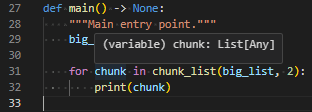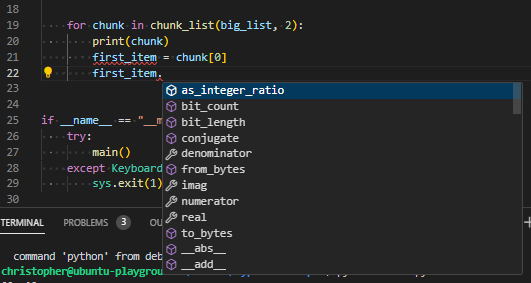Practical Generic Type Hinting in Python
If you’ve ventured into type hinting in Python, you’re probably aware of the fundamentals. You’re comfortable hinting function arguments and return types using basic types like int or str, and you may even be familiar with more complex typing like List[str] or Dict[str, int]. But the prospect of generic type hinting may seem confusing. What are they? Why do they exist? How do I use them? What value do they add?
One of my favorite pieces of wisdom from The Grug Brained Developer is regarding type systems like Python’s type hinting:
grug very like type systems make programming easier. for grug, type systems most value when grug hit dot on keyboard and list of things grug can do pop up magic. this 90% of value of type system or more to grug
In my opinion, this is the key value that type hinting brings to Python software development, especially if you’re not leveraging a static type checker like mypy. Type hinting allows your IDE of choice to best assist you through suggestions or autocomplete options while writing software. This enables you to write software quicker and with more confidence.
The purpose of generic type hinting is to clarify the types of objects that are passed into or returned from a function in situations where the type of an object might otherwise be ambiguous or “swallowed up” by the type hinting of the function itself.
Let’s demonstrate this with a simple example: We have a function named chunk_list that takes in a list, and chunks it up into a list of smaller lists.
1
2
3
4
def chunk_list(big_list: List[Any], chunk_size: int) -> List[List[Any]]:
"""Break up a big list into smaller lists."""
for i in range(0, len(big_list), chunk_size):
yield big_list[i : i + chunk_size] # noqa: E203
At first glance, the type hinting of the chunk_list function seems fine. The list passed into the function through the big_list argument could contain any type, so the Any type hinting seems appropriate. The return type of List[List[Any]] also seems logically appropriate, as we’re returning a list of lists, and each list could contain any type.
Let’s use this function to chunk up a list of integers into smaller lists.
1
2
3
4
5
6
7
8
9
10
11
12
13
14
15
16
17
18
19
20
21
22
23
import sys
from typing import Any, List
def chunk_list(big_list: List[Any], chunk_size: int) -> List[List[Any]]:
"""Break up a big list into smaller lists."""
for i in range(0, len(big_list), chunk_size):
yield big_list[i : i + chunk_size] # noqa: E203
def main() -> None:
"""Main entry point."""
big_list = list(range(5))
for chunk in chunk_list(big_list, 2):
print(chunk)
if __name__ == "__main__":
try:
main()
except KeyboardInterrupt:
sys.exit(1)
We can run this program and see that it works as advertised:
1
2
3
4
christopher@ubuntu-playground:~/GitHub/typevar-example$ python3 main.py
[0, 1]
[2, 3]
[4]
The problem is when we try to modify our code further to use the chunk variable pulled from the chunk_list function. Because we’ve type hinted the return value as Any, our IDE doesn’t know what options to offer us when trying to interact with this object. If we hover our cursor over the chunk object, it tells us it’s of type List[Any].
If we extract the first item from the list chunk, we still get no help from our IDE.
If we attempt to use the first item, our IDE is still of no help. To use this item properly, we have to mentally know that the first item is an int and that we can use it as such. That’s additional cognitive overhead for us in our already-encumbered mind. No thanks!
The problem here is that the Any type hint truly means anything. It’s possible that the chunk_list function will take in a list of integers and return a list of integers, but it’s also possible that it will take in a list of integers and return a list of strings. The Any type hinting doesn’t give us any additional information about the types of objects that are passed into or returned from the function.
Generic types seek to solve this issue by fleshing out the contract between the function’s arguments and its return value. Let’s refactor our function to use generic type hinting through TypeVar and see how that helps us. We define a new TypeVar named T and use it to type hint the big_list argument and the return value of the function.
1
2
3
4
5
6
7
8
9
10
11
12
13
14
15
16
17
18
19
20
21
22
23
24
25
26
import sys
from typing import List, TypeVar
T = TypeVar("T")
def chunk_list(big_list: List[T], chunk_size: int) -> List[List[T]]:
"""Break up a big list into smaller lists."""
for i in range(0, len(big_list), chunk_size):
yield big_list[i : i + chunk_size] # noqa: E203
def main() -> None:
"""Main entry point."""
big_list = list(range(5))
for chunk in chunk_list(big_list, 2):
print(chunk)
if __name__ == "__main__":
try:
main()
except KeyboardInterrupt:
sys.exit(1)
This type hinting signifies that the type containerized by the list of lists that is ultimately returned by the chunk_list function will be the same type contained within the big_list list passed into the function.
If we re-run this program, it executes precisely the same:
1
2
3
4
christopher@ubuntu-playground:~/GitHub/typevar-example$ python3 main.py
[0, 1]
[2, 3]
[4]
The real power from our use of generics comes when we interact with the chunk variable. If we hover over it, we see that it’s of type List[int] now, not a type of List[Any].
If we extract the first item from the list and hover our cursor over it, our IDE confirms it’s of type int.
Finally, if we attempt to use the first item, our IDE knows it’s an int and offers us all the options we’d expect. Neat!
This is the power of generic type hinting! It allows us to be more confident in our code and write it more quickly. It also allows us to reason about other people’s code, as our IDE can help us more easily understand what types of objects are being passed around code that may be unfamiliar to us.
The Grug Brained Developer put it best:
always most value type system come: hit dot see what grug can do, never forget!





